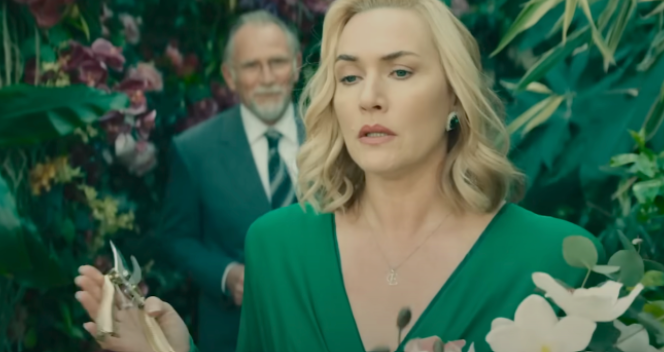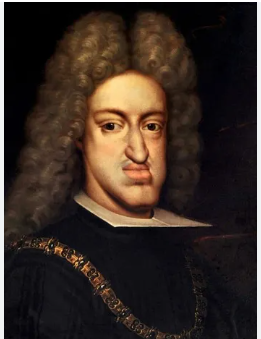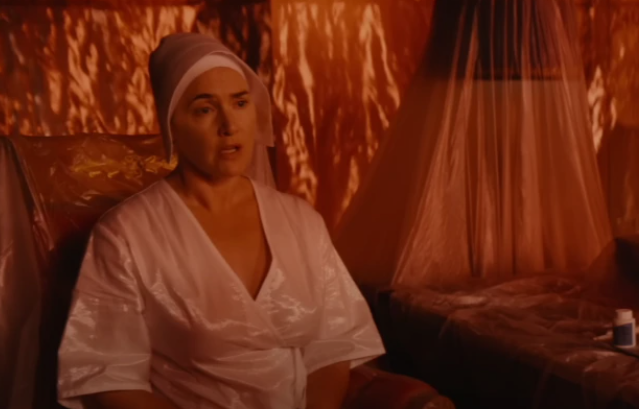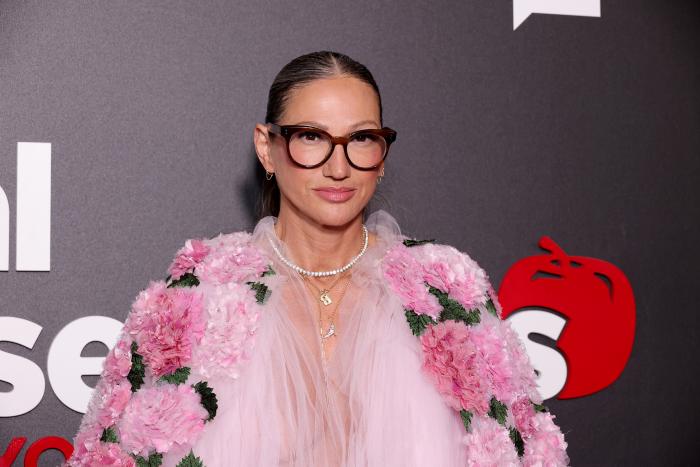

'The Regime' and the Aesthetics of Power in Decline
By Chris Revelle | TV | March 8, 2024 |
By Chris Revelle | TV | March 8, 2024 |

There’s a wet, mechanical whirring that the humidity-detecting wand makes whenever Herbert Zubak (Matthias Schoenaerts) uses it, trundling awkwardly before Chancellor Elena Vernham (Kate Winslet) in his duties as her “personal water diviner.” In the past, a water diviner was counted on to find water, the life-giving substance humans need to survive, but there in the dingy halls of the palace where all things are inverted, Zubak is hunting moisture like an enemy. The Chancellor is certain the palace is infested with mold that makes her ill and so, alongside the many murals and gold-framed walls of the ornate place are large gray dehumidifiers humming away. People are bade to not even breathe in the Chancellor’s direction lest she catch some uncleanliness that could make her sick, kill her, or, most terrifyingly, make her look weak.
The Regime, a mini-series streaming on Max, tells a story of power in decline and how in that decline a despot can find madness as they cling ever-harder to the power that slips away from them. In its presentation, you’ll find an astute collection of references that help paint a deeper picture of Elena and the unnamed country she rules. Even if the satire could be stronger and the comedy could pop more, by using a handful of recognizable references and well-chosen colors, The Regime conjures a crumbling Central European power structure.
Let’s start first with the palace itself. The exterior shots suggest that Elena’s country is situated somewhere between two mountains, perhaps somewhere in the Alps. The building itself appears as if it’s the Grand Budapest Hotel at its very lowest moment: an opulent structure that seems to sag under a patina of soot and age. The building is lit quite bleakly, with its dankness and darkness only emphasized by the flags draped over the front like hasty bunting. The flags are rather ugly with their bright red and bright blue uneasily forming around the crest of a leopard. Red and blue cancel each other out as colors, meaning neither color really pops, clashing with each other and with the grimy edifice of the palace. The message here is clear: this country is in dire straits and the level of pageantry suggested by the flags is ill-fitting and tacky-looking. It also suggests a willful ignorance as if the inhabitants of the palace are pretending everything is fine.
The interiors of the palace further this tension. The palace was evidently quite beautiful once upon a time with its Versailles-like flourishes and plentiful murals that wrapped entire rooms in scenes of trees and mountains. Everything is lit very dimly and with a touch of green in its lens that suggests ruin as if we’re seeing a forgotten place slimy with moss. Dehumidifiers, large fans, and numerous work crews litter the hallways as an endless renovation unfolds to rid the palace permanently of the sinister, unseen mold. Is the mold real? Yes and no. The show suggests that the literal mold threat is imagined or overstated by the paranoid Chancellor, but everything about the aesthetic screams decay. It’s a dank world we’re treated to, even if in actuality the palace is so dry that skin feels like “a mummy’s arsehole.” This gulf between reality and perception is an effective illustration of the Chancellor’s worldview. The world of the palace may be dry as a bone, but things are positively sodden with rot.
As Chancellor Elena Vernham, Winslet makes some effective choices to illustrate this theme of decline. At first, her accent is hard to place. It definitely sounds British, with a posh-sounding drollness, but Winslet adds another layer by chewing through her words with an enormous underbite. Aside from being another indicator of an affluent upbringing, this choice is especially genius for how it references old-world aristocracy in decline. Perhaps you’ve heard of the House of Habsburg, one of the most prominent dynasties in Europe’s history. Their power and influence were immense and they ruled almost the whole of Europe for many years. The Habsburgs are also a lesson in the perils of incest. To keep their royal blood “pure,” the Habsburgs inbred their way into a variety of genetic issues including infertility and what’s known as the Hapsburg Jaw aka a gigantic underbite. How gigantic? Check out King Charles II of Spain, among the last of the Habsburgs to die before the dynasty collapsed under its infertility:

Choosing a classic of aristocratic power dementing and degrading itself in decline as a reference for Elena is a smart move. It suggests everything about her: her arrogance, her ignorance, her imperiousness that is nonetheless a bit clownish. Habsburgs make power looks ridiculous and pathetic, and that’s a wonderful note to include in The Regime. As a bonus, the underbite forces Winslet to twist her mouth (not unlike what you see on Charles above) when she speaks, essentially speaking out the side of her mouth. It imparts a childish quality to Elena while also suggesting dishonesty. She’s willing to speak out of both sides of her mouth, figuratively and literally.
Elena’s obsession with mold and breath comes to a very telling head in the premiere episode. The Chancellor wakes in the night to the terrifying revelation that a stranger is sitting next to her on her bed. She immediately gives him her usual “I love you” spiel that she peppers into all her speeches and public-facing words, but the second he’s dispatched and dragged from the room, she shrieks and writhes in fear. She breathed his air. This spirals dramatically, with Elena sequestering herself with Zubak into a wing of the palace covered in plastic sheets. She wears an uncanny-looking white medical gown with a protective (?) Gilead-coded bonnet covering her head.

Previews for next week suggest that Zubak will introduce Elena to “folk medicine” to treat her condition. When taken with how Zubak has quickly become her lone viceroy, this references another classic of ruling class failures: the Romanovs. Alexei Nikolaevich was the heir apparent to the Russian empire but suffered from hemophilia, a condition called “the Royal Disease” due to how often it occurred as a result of intermarriage and inbreeding. To treat his condition, the Romanovs brought in a famously chill and cool guy called Rasputin who claimed he could cure the disease with a mix of pseudo-science and religious zealotry. This connection afforded Rasputin an outsized amount of influence over the Romanovs that he used to climb the social ladder. This suggests that Zubak is Elena’s Rasputin, a manipulative influence who will only make worse what was already bad. This hammers home how deeply steeped The Regime is in the aesthetic of power in decline. And lest you think a Rasputin-esque figure is only a figure of the distant past, in 2016 South Korea impeached their president for, among other things, falling under the influence of a shamanistic cult. Though The Regime uses the sins of despots past to illustrate its story, the parable of crumbling power is timeless.
← Three Trailers: 'Sing Sing,' 'Sieze Them,' and 'Hit Man' | 'Rust' Trial of Hannah Gutierrez-Reed Showed an Appalling Lack of Gun Safety →
More Like This
Charming Ramy Youssef Mines the Comedy of NPR's Tiny Desk Concerts as Host of 'SNL'
Spoilers: Netflix’s Korean Comedy 'Chicken Nugget' Is Getting Review-Bombed Over A Single Joke
How 'The Regime' and 'Palm Royale' Complicate Their Genres
Jenna Lyons Has Conditions For ‘Real Housewives’ Return
This Week On ‘Selling Sunset’: Irreconcilable Differences

Jenna Lyons Has Conditions For ‘Real Housewives’ Return
This Week On ‘Selling Sunset’: Irreconcilable Differences
Huey Lewis Was Inspired By 'Mamma Mia' For His Next 'Career Event'
Paramount+ Is Getting Cues From David Zaslav
Yorgos Lanthimos Reteams with Emma and Viggo Goes West In Three Trailers
Kristen Stewart Will Never Make an ‘Algorithmic’ Marvel Movie
More Like This
Charming Ramy Youssef Mines the Comedy of NPR's Tiny Desk Concerts as Host of 'SNL'
Spoilers: Netflix’s Korean Comedy 'Chicken Nugget' Is Getting Review-Bombed Over A Single Joke
How 'The Regime' and 'Palm Royale' Complicate Their Genres
Jenna Lyons Has Conditions For ‘Real Housewives’ Return
This Week On ‘Selling Sunset’: Irreconcilable Differences
Reviews